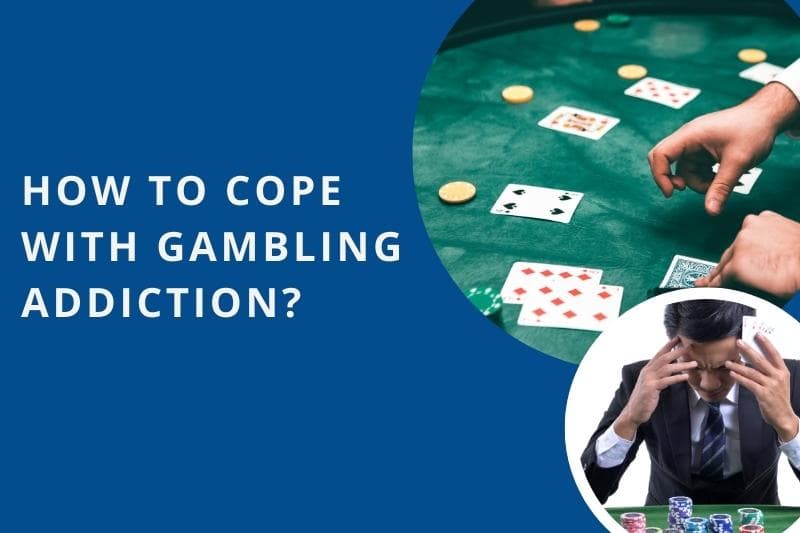How to Cope With Gambling Addiction?


Gambling addiction, also referred to as compulsive gambling or gambling disorder, is a severe mental illness in which an individual finds it difficult to stop gambling despite the adverse effects it has on their life. Gambling addiction may cause emotional turmoil, financial destruction, and deteriorating relationships.

Once someone quits gambling, going back to recreational or casual gambling is never a safe choice. For most, long-term recovery means an entire lifestyle change—one that replaces gambling with positive habits, emotional stability, and a strong support system.
If you or your loved one is struggling with this problem, don't delay. In this blog, we’ll give you practical tips to stop gambling and rebuild your life.
Gambling Addiction: Signs and Symptoms
Gambling addiction refers to not being able to stop playing despite it causing issues. These are some of the signs to watch out for:
- Constantly thinking of gambling: You constantly think of playing games or when to play again.
- Increasing the amount of money you bet: You need to bet more money to get excited.
- Can't stop: You can't stop gambling.
- Gamble to feel better: You gamble to forget about your stress, sadness, or troubles.
- Try to win back lost money: In case you lose, you gamble to gain it back.
- Hiding gambling from others: You deny or conceal your gambling from family or friends.
- Money troubles: You borrow money, sell items, or are not able to pay bills due to gambling.
- Quarrelling with family or friends: Your gambling leads to fights and people no longer trust you.
- Feeling irritable when not gambling: You feel angry, sad, or worried when you are unable to gamble.
How to Stop Gambling Addiction?
If you are wondering how to stop gambling forever, then you can follow these tips and stop gambling forever.
Avoid boredom by planning-
Experts at a rehabilitation centre in Mumbai suggest that gamblers who used to go with the highs and lows of active addiction generally struggle with boredom in their lives. So if you want to stay away from it, then you should try and plan your days so that you are not tempted to fill empty spaces by gambling. Research also seems to back these consistent findings and shows that problem gamblers have a low threshold for boredom.
Live your life peacefully, following the rule of one day at a time-
You need to forget everything that happened yesterday and just focus on today. Experts at the best psychiatrist hospital in Mumbai suggest you keep stress away and not worry about what tomorrow might hold for you. It would be best if you focused on what you do today.
Do something unique-
You can learn how to stop gambling and save money when you do something unique because your brain has got used to doing something regularly, that is gambling, and it is constantly stimulated now that you have stopped, so you should set new objectives every day. Then, when you are focused on problem-solving, you will be better able to cope with gambling urges.
Rekindle the hobby-
Gamblers generally lose interest in hobbies as they become more and more addicted to gambling. However, once you have stopped, it is vital to rekindle your old hobbies. It will help you improve your self-esteem and provide a regular reminder for your new life. Like behavioural addictions, it is essential to find a healthy activity to replace the damaging habit. This will help you stay focused on the benefits of your new way of life instead of just focusing on what you are missing.
Find ways that help you cope better with stress-
Stress is generally a barometer of how we manage our emotions and can significantly contribute to relapse from gambling recovery. Therefore, finding new healthy ways to cope with stress is essential, whether meditation, physical exercise, or hypnotherapy. The risk is that the temptation to gamble will become more vital when you are more stressed.
Remind yourself that gambling is all about losing-
It is essential to remind yourself if you want to keep away from Gambling addiction symptoms when you need to remind yourself that when you are into gambling, you will lose your hard-earned money, irrespective of your betting strategy. It is a fundamental element of problem gambling. Gambling urges might appear as seductive temptations when you are undergoing financial worries, especially as effective forms of gambling offer the potential of immediate high rewards.
Identify some self-sabotage triggers-
Your clean time is undoubtedly precious, so you need to see any urge to gamble as a temporary man and be prepared for it to emerge before your special occasions like birthdays, wedding anniversaries, or even exam time.
Visualise you’re betting casino with a negative slogan-
One of the most vital things that works as a Motivation to stop gambling is visualising your betting casino with a negative symbol. You need to associate your betting platform with a negative conversion and imagine a bad image when you think of the operator's logo. This way, you can seek to embed the antagonistic buyers of gambling in your subconscious, and it will help you remember exactly how low and desperate you felt when you stopped.
Journal gratitude affirmations or make a gratitude list-
You have to be aware of how better your life is without gambling. If this confirms any spiritual practice, then all the better. You are less likely to be searching for excitement when you are grateful for what you really have. The attitude of gratitude works.
Jagruti Rehab Centres in India
If you are wondering whether gambling addiction can be cured or not, you must know that you must visit Jagruti Rehab Centre because experts here are well-trained and can help you lead a life away from addiction.
Frequently asked questions
How do you stop your addiction to gambling?
How do you stop your addiction to gambling?
Quitting gambling addiction usually involves a combination of therapy, support groups, and lifestyle changes. Cognitive Behavioural Therapy (CBT), attending a Gamblers Anonymous meeting, and consulting with mental health professionals can be helpful methods for quitting. Avoiding triggers and placing financial boundaries can also help.
Is gambling a mental illness?
Is gambling a mental illness?
Gambling addiction is a behavioural disorder and is identified by the Diagnostic and Statistical Manual of Mental Disorders (DSM-5) as a mental disorder. It entails compulsive behaviour despite adverse consequences, just like substance addictions.
What does a gambling addiction feel like?
What does a gambling addiction feel like?
Gamblers with gambling addiction have an intense urge to gamble, even if they can’t afford it. There is always a pursuit of winning back losses, guilt, or shame, and an inability to control or stop the behaviour. It may also result in anxiety, stress, and relationship issues.
Is gambling good or bad?
Is gambling good or bad?
Moderate gambling can be enjoyed as entertainment, but when it turns into addiction, it can prove to be destructive. Problem gambling has significant ill effects on one’s mental well-being, interpersonal relationships, and financial well-being. So even though gambling isn’t necessarily “bad,” one needs to stay within limits.
Book a Confidential Consultation with Our Experts
Our team of medical professionals is there to hear and guide you towards the right treatment plan. Get the right professional advice, instant support and confidential consultations with recovery plans especially tailored to your needs.











